
Revue des Mondes Musulmans et de la Mediterranee
Scope & Guideline
Navigating the Complexities of Cultural Identities
Introduction
Aims and Scopes
- Cultural Practices and Traditions:
The journal explores the rich tapestry of cultural practices within Muslim communities, including religious celebrations like Mawlid, the significance of communal organizations, and the interplay between tradition and modernity. - Historical Analysis:
It provides in-depth historical analyses of various Muslim societies across different periods, examining events, figures, and movements that have shaped the region's socio-political landscape. - Interdisciplinary Approaches:
The journal employs interdisciplinary methodologies, integrating perspectives from history, sociology, anthropology, and literary studies to present a comprehensive understanding of its subjects. - Contemporary Issues in Muslim Societies:
It addresses pressing contemporary issues facing Muslim societies, such as political movements, gender dynamics, and religious debates, providing insights into their historical roots and current implications. - Mediterranean Studies:
The journal also emphasizes the historical and contemporary interactions within the Mediterranean basin, exploring themes of migration, colonialism, and cultural exchange.
Trending and Emerging
- Gender and Feminism:
Recent publications have increasingly addressed gender issues and feminist perspectives within Muslim societies, highlighting women's roles, activism, and the impact of socio-political changes on gender dynamics. - Contemporary Political Movements:
There is a growing emphasis on contemporary political movements and their historical contexts, particularly in relation to the Arab Spring, Islamist movements, and the evolving nature of governance in the region. - Cultural Interactions and Hybridity:
The exploration of cultural interactions, particularly the hybridization of traditions in the context of migration and globalization, has gained traction, reflecting the complex realities of modern Muslim identities. - Environmental and Social Issues:
Emerging themes also include discussions on environmental challenges and social issues, such as the impact of climate change on Mediterranean communities and the socio-economic aspects of migration.
Declining or Waning
- Traditional Religious Debates:
The frequency of papers focusing solely on traditional religious debates, such as the jurisprudential discussions around the Mawlid, has decreased, possibly indicating a shift towards more contemporary social issues. - Colonial and Post-Colonial Studies:
Although still relevant, the exploration of colonial and post-colonial themes appears less frequent, suggesting a potential waning interest in historical colonial narratives in favor of current socio-political contexts. - Narrow Ethnic Studies:
There is a noticeable decline in papers focused on specific ethnic studies, such as the detailed examination of Berber identity, as the journal increasingly embraces broader themes that encompass multiple identities and experiences.
Similar Journals

Acta Historica Universitatis Klaipedensis
Unveiling the Past, Shaping the FutureActa Historica Universitatis Klaipedensis is a distinguished open access journal that has been contributing to the field of history since its inception. Published by the Institute of Baltic Region History & Archaeology at Klaipeda University, this influential journal, ISSN 1392-4095 and E-ISSN 2351-6526, has rapidly established itself as a credible platform for scholarly discourse in historical studies. Since its transition to an open access model in 2021, it has widened its reach, allowing researchers, professionals, and students across the globe to freely access and disseminate knowledge pertaining to history in the Baltic region and beyond. Following a rigorous peer-review process, contributions are meticulously curated to ensure a high standard of scholarly output. The journal holds a respectable Q3 ranking in the History category as of 2023, with a Scopus rank placing it among the top 20% of journals in its field.

Lusotopie
Bridging Cultures: Unveiling Lusophone DynamicsLusotopie is a distinguished academic journal dedicated to the exploration of cultural, social, and political dynamics in Lusophone societies, providing a pivotal platform for researchers and scholars in the fields of anthropology, history, and cultural studies. Published by Lusotopie, the journal features contributions that foster a deeper understanding of the linguistic, historical, and cultural connections across Portuguese-speaking communities, making it an essential resource for academics and professionals alike. With its ISSN 1257-0273 and E-ISSN 1768-3084, the journal aims to bridge interdisciplinary gaps while promoting critical discourse in the study of Lusophone regions. Although Lusotopie does not operate under an open access model, it remains committed to enhancing scholarly dialogue and disseminating significant research findings. The journal has cultivated a reputation for publishing quality articles, researched during its active years since 1999, thereby securing its place as an important contributor to the academic landscape of Mediterranean studies. Researchers, professionals, and students interested in the cultural intricacies and sociopolitical issues facing the Lusophone world will find Lusotopie an invaluable resource.
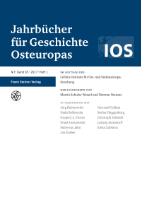
JAHRBUCHER FUR GESCHICHTE OSTEUROPAS
Enriching Understanding of Eastern Europe's Cultural ChroniclesJAHRBUCHER FUR GESCHICHTE OSTEUROPAS, published by FRANZ STEINER VERLAG GMBH, is a prominent academic journal dedicated to the exploration of Eastern European history. With its inception dating back to 1978, this journal has consistently provided a platform for scholarly discourse, contributing significantly to the understanding of the region's complex historical narratives. While the journal is not open access, it holds a solid reputation within the academic community, positioned in the Q4 quartile in history as per the 2023 category rankings, and stands at Rank #1636 within the Scopus Arts and Humanities History ranking. The convergence of its publication years throughout the decades emphasizes a long-standing commitment to historical research, thereby making it an essential resource for researchers, professionals, and students interested in Eastern European studies. Explore the intricate dynamics of historical events and cultural developments that shape Eastern Europe through this invaluable periodical.
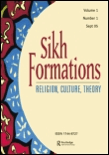
Sikh Formations-Religion Culture Theory
Illuminating Sikh Perspectives in a Global ContextSikh Formations: Religion, Culture, Theory is a premier academic journal published by Routledge Journals, Taylor & Francis Ltd, focusing on the intersection of Sikh studies, religious theory, and cultural discourse. With its ISSN 1744-8727 and E-ISSN 1744-8735, this journal is recognized for its significant contributions to the fields of Religious Studies and Cultural Studies, currently ranking in the top quartiles, Q1 and Q2 respectively, highlighting its scholarly impact. The journal covers a broad spectrum of topics related to Sikhism, offering a platform for researchers and professionals to explore new theoretical perspectives and cultural analyses. The journal's extensive archive, spanning from 2005 to 2024, ensures a rich resource for academic inquiry. With access options tailored for various researchers and a commitment to academic excellence, Sikh Formations continues to play a vital role in enriching the understanding of Sikh culture and its global implications.

Codrul Cosminului
Unveiling Insights from the Heart of Cultural ScholarshipCodrul Cosminului, published by Stefan cel Mare University in Romania, is an esteemed open-access journal that has been facilitating scholarly discourse since 2004. With an ISSN of 1224-032X and an E-ISSN of 2067-5860, it plays a crucial role in the fields of Cultural Studies, History, Political Science, International Relations, and Religious Studies. The journal’s impact is evidenced by its 2023 categorization in Q2 for multiple disciplines, marking it as a reputable platform for researchers. This interdisciplinary journal serves as a vital resource for academics and practitioners alike, encouraging contributions that explore diverse cultural and historical narratives. The Scopus rankings further illustrate its relevance, positioning it within influential tiers across its fields. Researchers and students will find Codrul Cosminului invaluable for accessing high-quality, peer-reviewed content that enhances their understanding of complex societal and cultural dynamics.
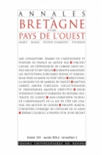
ANNALES DE BRETAGNE ET DES PAYS DE L OUEST
Navigating the Depths of Literature and HistoryANNALES DE BRETAGNE ET DES PAYS DE L OUEST, published by UNIV HAUTE-BRETAGNE, serves as a vital scholarly resource within the fields of arts and humanities, particularly focusing on literature, literary theory, and history. Established in 1974, the journal has diligently explored the cultural and historical dimensions of Brittany and Western France, while promoting interdisciplinary discourse among researchers and professionals. Despite its recent discontinuation in Scopus, the journal continues to hold significance with an ISSN of 0399-0826 and an E-ISSN of 2108-6443, reflecting its dedication to preserving and disseminating regional scholarly work. With a focus on fostering knowledge production and exploration of local histories, ANNALES DE BRETAGNE ET DES PAYS DE L OUEST remains an essential publication for students and scholars aiming to engage with the rich cultural tapestry of Western France.
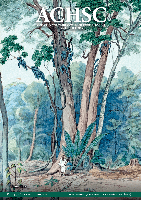
Anuario Colombiano de Historia Social y de la Cultura
Unveiling Colombia's Past, Shaping Its FutureAnuario Colombiano de Historia Social y de la Cultura is a distinguished academic journal published by the Universidad Nacional de Colombia, within the Faculty of Human Sciences and the Department of History. With an ISSN of 0120-2456 and an E-ISSN of 2256-5647, this journal has been an essential resource in the fields of Cultural Studies and History, particularly focusing on Colombian history and its cultural dynamics. Recognized for its scholarly contributions, it holds a Q3 ranking in both Cultural Studies and History categories as of 2023, with notable positions in Scopus rankings. The journal has been committed to the principles of Open Access since 2012, ensuring widespread dissemination of knowledge and fostering greater engagement among researchers, professionals, and students. With publication converging from 2013 to 2024, it tackles critical issues relevant to understanding Colombia's social and cultural contexts, inviting a diverse range of articles that stimulate scholarly discussion and research development. The journal's office is located in Bogotá, Colombia, continuing to establish itself as a key player in the academic landscape of the humanities.
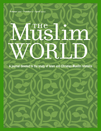
MUSLIM WORLD
Innovating Research on the Intersections of Islam and SocietyThe Muslim World is a prestigious peer-reviewed journal published by Wiley, focusing on the intricate relationships and contributions of Islam within various domains of humanities and social sciences. With its roots tracing back to 1911 and converging until 2024, the journal encompasses an expansive historical perspective, enriching the understanding of Islamic culture, history, and its contemporary political significance. The journal holds a commendable impact in the field, as evidenced by its Q1 ranking in History and Religious Studies, and notable positions in Political Science and Sociology categories, signifying its substantial influence among researchers and academics. While operating under a subscription model, The Muslim World remains a crucial platform for fostering scholarly dialogue, promoting innovative research, and disseminating pivotal findings in its areas of study. With an ISSN of 0027-4909 and an E-ISSN of 1478-1913, it is committed to advancing knowledge within the framework of interdisciplinary studies, appealing to seasoned scholars and emerging researchers alike.
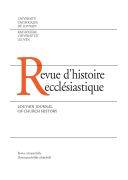
REVUE D HISTOIRE ECCLESIASTIQUE
Illuminating European Ecclesiastical DevelopmentsREVUE D HISTOIRE ECCLESIASTIQUE, an esteemed publication in the field of religious studies, is published by CULTURA, nestled in the heart of Belgium. This journal has carved out its niche in the academic world since its inception, covering significant developments in ecclesiastical history with an emphasis on European contexts. Despite its established presence since 1980, the journal has significantly evolved in its scope and rigor from 2002 to 2023, consistently contributing to scholarly discourse with its critical analyses and cutting-edge research. Currently placed in the Q3 category of religious studies according to the latest Scopus rankings, it positions itself within the 17th percentile, affirming its relevance and impact in the academic community. The journal provides a platform for researchers, professionals, and students alike to engage with comprehensive studies that could shape future inquiries and inclusivity in ecclesiastical narratives.

JOURNAL OF CHURCH AND STATE
Navigating the Intricacies of Faith in the Public SphereJournal of Church and State is a leading interdisciplinary journal dedicated to the exploration of the complex relationships between religion and government, published by Oxford University Press. With an ISSN of 0021-969X and an impressive E-ISSN of 2040-4867, this journal serves as an essential platform for scholars in the fields of History, Religious Studies, and Sociology and Political Science. Recognized for its scholarly contributions, it holds a prestigious Q1 ranking in both History and Religious Studies, positioning it among the top journals in these disciplines for 2023. The journal’s robust scope spans historical perspectives, contemporary debates, and critical analyses related to church-state interactions, making it indispensable for researchers, professionals, and students alike. With access options that reflect its academic integrity, the Journal of Church and State continues to enrich scholarly discourse and foster a deeper understanding of religious influences on governance and vice versa.